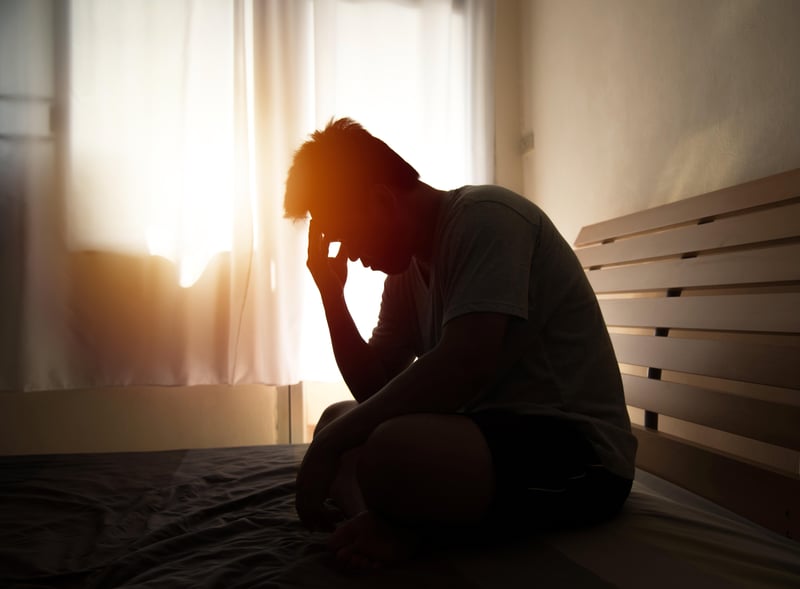Manténgase sano!

- Dennis Thompson
- Posted November 29, 2022
Long COVID Often Brings Another Issue: Stigma
People with long COVID deal with months or years of punishing fatigue, mind-numbing brain fog or a frightening fight to take each and every breath.
But they can also face the skepticism of others, a new study finds -- employers and doctors questioning whether they're really sick, friends avoiding them, family losing patience.
About 95% of people living with long COVID say they've experienced at least one type of stigma, and three out of four say they are stigmatized "often" or "always" by their condition, researchers report.
"Our findings suggest that long COVD is currently more stigmatized than many other long-term conditions, such as HIV and depression," said lead researcher Marija Pantelic, a lecturer in public health at Brighton and Sussex Medical School in the United Kingdom. "Nearly all of the people living with long COVID who took part in this study experienced some form of stigma related to this illness."
Long COVID affects more than 30% of patients who are hospitalized with COVID, according to the U.S. Centers for Disease Control and Prevention.
The symptoms of long COVID can be demoralizing but also confoundingly vague, which can promote some skepticism, said Dr. Aaron Glatt, chair of medicine and chief of infectious diseases at Mount Sinai South Nassau.
"People might say, 'Well, I had COVID and I'm not sick. So how come you had COVID and you're still sick? I don't believe it.' Especially when it's such nonspecific findings," Glatt said. "Somebody has a broken arm, that's pretty obvious. Somebody says, I'm fatigued, then everybody around them says, well, I'm tired also."
To assess whether people with long COVID are being stigmatized over their condition, researchers surveyed more than 1,100 people online.
Most participants (888) were from the United Kingdom, and about half had an official diagnosis of long COVID. Others said doctors suspect they have long COVID, but they hadn't yet been diagnosed.
Nearly two of three (63%) long COVID patients said they had experienced direct stigma and discrimination as a result of their illness, results showed.
They said people had acted as if they were lying about the extent of their symptoms, treated them with disrespect and unkindness, or outright started avoiding them.
"What we are seeing so far is that the stigma seems to be everywhere," Pantelic said. "People living with long COVID report losing friends due to long COVID, being dismissed by health care providers, and losing their jobs due to being unwell."
About 91% said they expect to experience stigma at some point due to their long COVID symptoms, and another 86% said they felt a profound sense of shame related to their condition.
People with a clinical diagnosis of long COVID were more likely to report stigma than those without a diagnosis, 83% versus 69%.
As a result of this stigma, long COVID patients said they tend to be close-mouthed about their condition.
About 61% said they are very careful who they tell about their condition, and 34% said they regretted having told people about it.
The findings were reported Nov. 23 in the journal PLOS ONE.
Stigma over long COVID isn't just happening in the United Kingdom, said University of Texas infectious disease specialist Dr. Luis Ostrosky, who works in his hospital's long COVID clinic.
"This is exactly what I hear from my patients regularly," Ostrosky said. "They feel they're stigmatized by getting labeled with long COVID."
Sadly, doctors are taking part in the stigmatization of long COVID patients, he said, in ways similar to how people with depression or chronic fatigue are treated.
"The patients go from doctor to doctor to doctor who don't believe they're experiencing the symptoms," Ostrosky said. "They're not familiar with this illness, so they disregard it and they don't know how to diagnose or treat them. A lot of cases get mislabeled as mental illness."
Long COVID stigma also comes at patients from many other directions, Ostrosky said.
"We have some workplaces that keep requiring documentation that they're pretty much disabled, which is what happens to some of our patients," Ostrosky said. "We continuously have to justify treatments with insurance companies that question the diagnosis.
"Even spouses sometimes get frustrated, because they don't understand what's happening," he continued. "Most spouses are very supportive, but at some point they will suspect the patient is malingering somehow, and then there are marital problems."
Fatigue is one of the most common long COVID symptoms questioned by others, even though it can be "very deep and disabling," Ostrosky said.
Another is post-exertional malaise, "where people feel better and they take part in some work or activity, and then after that they get this deep fatigue for the next two to three days," Ostrosky said.
People also raise their eyebrows at the "famous" long COVID symptom known as "brain fog," where people can't concentrate or are slower on the uptake, Ostrosky said.
Folks with long COVID can directly combat this stigma by fully documenting their condition, Glatt said.
"People could face some stigma because others don't fully appreciate how sick patients with long COVID can be," Glatt said. "Hopefully if you can document it with your physician, like with any other medical illness, you should be treated like anybody with a medical disability."
Better public awareness will also help, the experts said.
"We desperately need clear, consistent messaging that long COVID is real and that it can happen to anyone," Pantelic said. "It's not a disease of the weak or the stressed-out."
More information
The U.S. Centers for Disease Control and Prevention has more about long COVID.
SOURCES: Marija Pantelic, MSc, DPhil, lecturer, public health, Brighton and Sussex Medical School, Brighton, England; Aaron Glatt, MD, chair, medicine, and chief, infectious diseases, Mount Sinai South Nassau, Oceanside, N.Y.; Luis Ostrosky, MD, infectious disease specialist, University of Texas Health, Houston; PLOS ONE, Nov. 23, 2022





